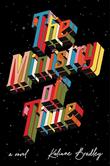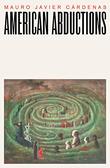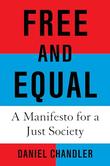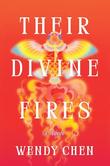
by Daniil Rozental ‧ RELEASE DATE: N/A
A thought-provoking SF tale recalling the heady works of William Gibson and Philip K. Dick.
Awards & Accolades
Our Verdict

GET IT
In Rozental’s dystopic novel, one man descends into madness—or possibly finds transcendence—as he struggles to distinguish between reality, hallucinations, and AI virtual worlds.
Set in a near future in which Venice and other coastal cities are underwater, Paris has been incinerated in a nuclear blast, and surviving cities like Moscow are plagued by permanent rolling blackouts, the vast majority of humanity finds escape in the Flow, a virtual-reality simulation of the world that’s powered by users’ subconscious desires. The story follows Nikolai Vasilyev, who’s a shadow of the man he used to be. Once a renowned actor, he’s now a down-and-out alcoholic struggling to come to grips with the death of his wife, who died years earlier. Essentially begging for some vegetables and a bottle of vodka at a store in an impoverished Moscow neighborhood, Nikolai agrees to deliver a gift (a wooden case containing two glass beakers filled with a transparent liquid) to the store proprietor’s cousin. But the simple deed goes awry as Nikolai questions whether he’s hallucinating, institutionalized in a mental hospital, stuck inside the Flow, or a spy in a secret program run by an AI research institute. With what might be the spirit of his dead wife leading him through a surreal dreamscape, Nikolai finally discovers the mind-blowing truth. Powered by an unreliable narrator and set in an all-too-plausible future inhabited by zombified VR users who have lost touch with the real world, the mind-bending narrative works so well in large part because of the author’s utterly compelling prose style. Rozental’s use of darkly lyrical imagery throughout is an undeniable strength: Old apple trees loom in the darkness as “huge spiders,” a woman’s wrinkled hands and crooked fingers resemble “the branches of a rain-starved tree,” and a white church melts into the darkness “like a lump of sugar in a cup of hot coffee.”
A thought-provoking SF tale recalling the heady works of William Gibson and Philip K. Dick.Pub Date: N/A
ISBN: N/A
Page Count: -
Publisher: N/A
Review Posted Online: April 24, 2024
Review Program: Kirkus Indie
Share your opinion of this book

by Max Brooks ‧ RELEASE DATE: June 16, 2020
A tasty, if not always tasteful, tale of supernatural mayhem that fans of King and Crichton alike will enjoy.
Awards & Accolades
Likes

144
Our Verdict

GET IT
New York Times Bestseller
Are we not men? We are—well, ask Bigfoot, as Brooks does in this delightful yarn, following on his bestseller World War Z(2006).
A zombie apocalypse is one thing. A volcanic eruption is quite another, for, as the journalist who does a framing voice-over narration for Brooks’ latest puts it, when Mount Rainier popped its cork, “it was the psychological aspect, the hyperbole-fueled hysteria that had ended up killing the most people.” Maybe, but the sasquatches whom the volcano displaced contributed to the statistics, too, if only out of self-defense. Brooks places the epicenter of the Bigfoot war in a high-tech hideaway populated by the kind of people you might find in a Jurassic Park franchise: the schmo who doesn’t know how to do much of anything but tries anyway, the well-intentioned bleeding heart, the know-it-all intellectual who turns out to know the wrong things, the immigrant with a tough backstory and an instinct for survival. Indeed, the novel does double duty as a survival manual, packed full of good advice—for instance, try not to get wounded, for “injury turns you from a giver to a taker. Taking up our resources, our time to care for you.” Brooks presents a case for making room for Bigfoot in the world while peppering his narrative with timely social criticism about bad behavior on the human side of the conflict: The explosion of Rainier might have been better forecast had the president not slashed the budget of the U.S. Geological Survey, leading to “immediate suspension of the National Volcano Early Warning System,” and there’s always someone around looking to monetize the natural disaster and the sasquatch-y onslaught that follows. Brooks is a pro at building suspense even if it plays out in some rather spectacularly yucky episodes, one involving a short spear that takes its name from “the sucking sound of pulling it out of the dead man’s heart and lungs.” Grossness aside, it puts you right there on the scene.
A tasty, if not always tasteful, tale of supernatural mayhem that fans of King and Crichton alike will enjoy.Pub Date: June 16, 2020
ISBN: 978-1-9848-2678-7
Page Count: 304
Publisher: Del Rey/Ballantine
Review Posted Online: Feb. 9, 2020
Kirkus Reviews Issue: March 1, 2020
Share your opinion of this book
More by Max Brooks
BOOK REVIEW
by Max Brooks
More About This Book
BOOK TO SCREEN

by Cixin Liu ; translated by Joel Martinsen ‧ RELEASE DATE: Aug. 11, 2015
Once again, a highly impressive must-read.
Second part of an alien-contact trilogy (The Three-Body Problem, 2014) from China’s most celebrated science-fiction author.
In the previous book, the inhabitants of Trisolaris, a planet with three suns, discovered that their planet was doomed and that Earth offered a suitable refuge. So, determined to capture Earth and exterminate humanity, the Trisolarans embarked on a 400-year-long interstellar voyage and also sent sophons (enormously sophisticated computers constructed inside the curled-up dimensions of fundamental particles) to spy on humanity and impose an unbreakable block on scientific advance. On Earth, the Earth-Trisolaris Organization formed to help the invaders, despite knowing the inevitable outcome. Humanity’s lone advantage is that Trisolarans are incapable of lying or dissimulation and so cannot understand deceit or subterfuge. This time, with the Trisolarans a few years into their voyage, physicist Ye Wenjie (whose reminiscences drove much of the action in the last book) visits astronomer-turned-sociologist Luo Ji, urging him to develop her ideas on cosmic sociology. The Planetary Defense Council, meanwhile, in order to combat the powerful escapist movement (they want to build starships and flee so that at least some humans will survive), announces the Wallfacer Project. Four selected individuals will be accorded the power to command any resource in order to develop plans to defend Earth, while the details will remain hidden in the thoughts of each Wallfacer, where even the sophons can't reach. To combat this, the ETO creates Wallbreakers, dedicated to deducing and thwarting the plans of the Wallfacers. The chosen Wallfacers are soldier Frederick Tyler, diplomat Manuel Rey Diaz, neuroscientist Bill Hines, and—Luo Ji. Luo has no idea why he was chosen, but, nonetheless, the Trisolarans seem determined to kill him. The plot’s development centers on Liu’s dark and rather gloomy but highly persuasive philosophy, with dazzling ideas and an unsettling, nonlinear, almost nonnarrative structure that demands patience but offers huge rewards.
Once again, a highly impressive must-read.Pub Date: Aug. 11, 2015
ISBN: 978-0-7653-7708-1
Page Count: 480
Publisher: Tor
Review Posted Online: June 2, 2015
Kirkus Reviews Issue: June 15, 2015
Share your opinion of this book
More by Cixin Liu
BOOK REVIEW
BOOK REVIEW
by Cixin Liu ; translated by Joel Martinsen
BOOK REVIEW
by Cixin Liu ; translated by Joel Martinsen
More About This Book
BOOK TO SCREEN
BOOK TO SCREEN
© Copyright 2024 Kirkus Media LLC. All Rights Reserved.
Hey there, book lover.
We’re glad you found a book that interests you!
We can’t wait for you to join Kirkus!
It’s free and takes less than 10 seconds!
Already have an account? Log in.
OR
Trouble signing in? Retrieve credentials.
Welcome Back!
OR
Trouble signing in? Retrieve credentials.
Don’t fret. We’ll find you.





